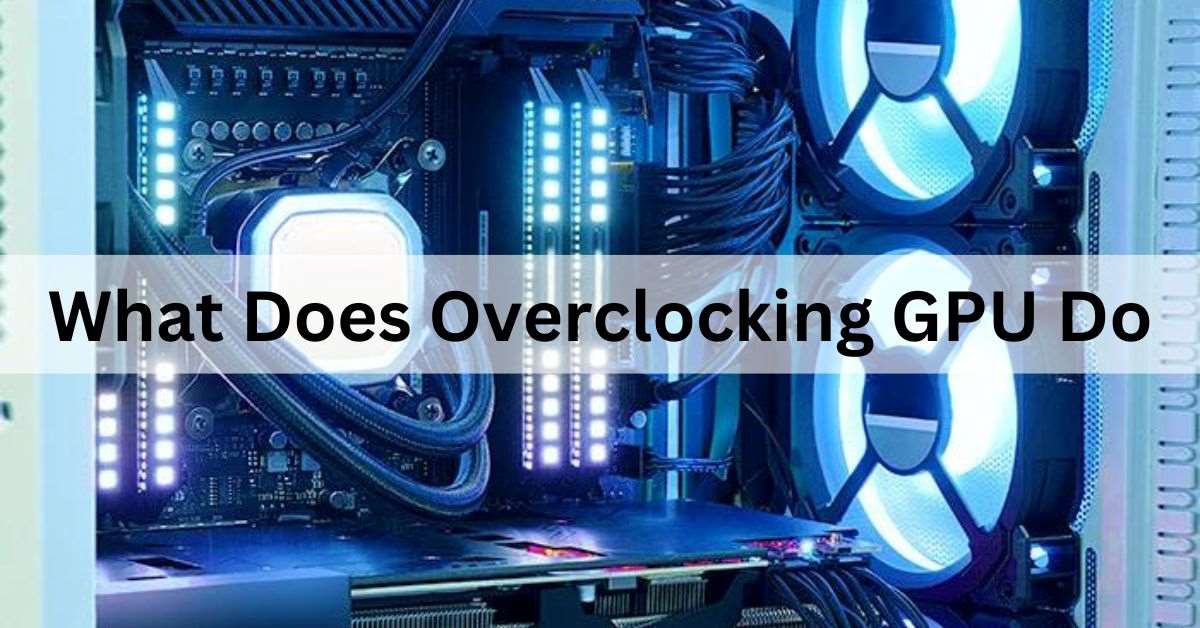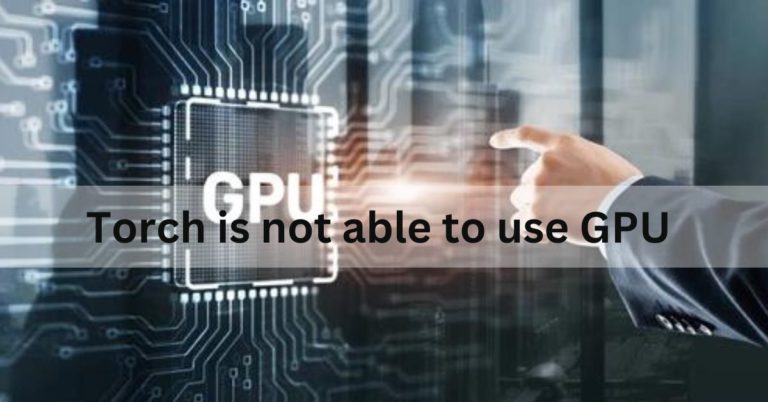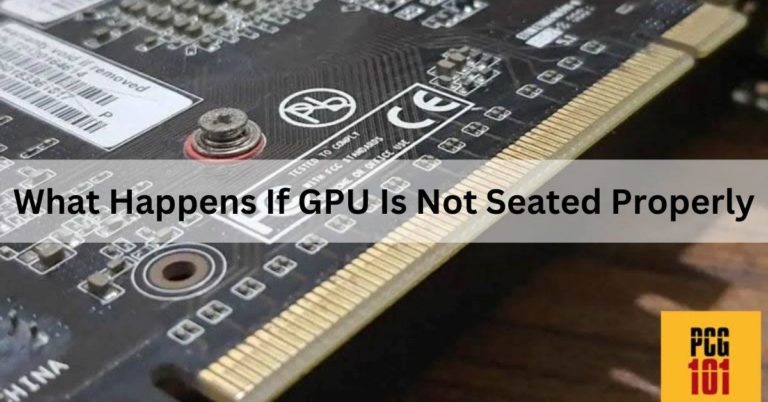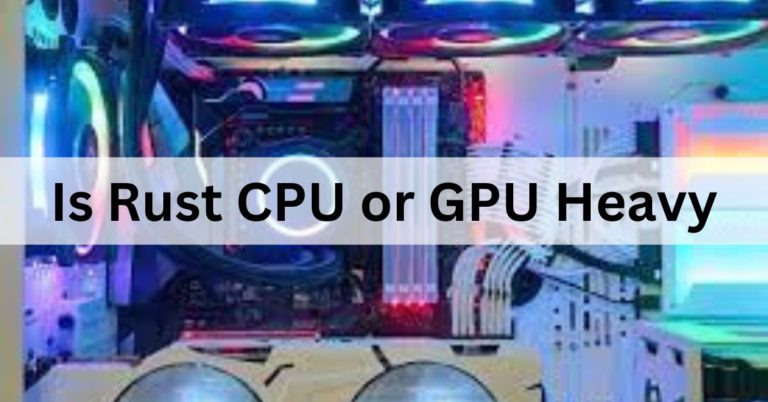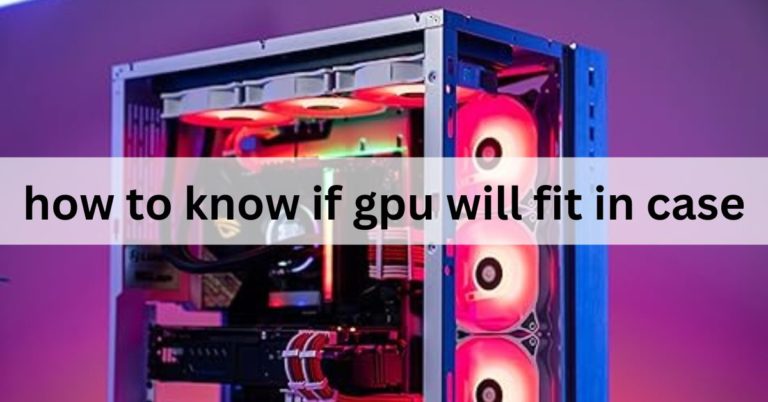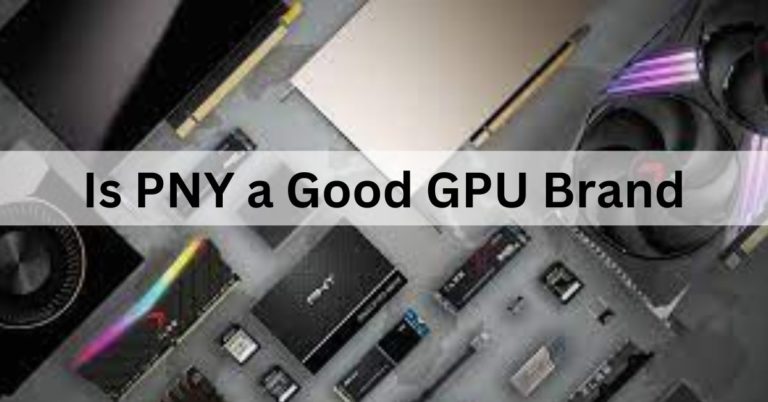What Does Overclocking GPU Do – Ultimate Guide – 2024
Overclocking GPU involves pushing the graphics processing unit (GPU) beyond its default specifications to enhance performance. Users aim to achieve higher frame rates and smoother gameplay in graphics-intensive applications such as gaming and video editing by increasing the GPU’s clock speed and sometimes adjusting voltage settings.
Overclocking GPU increases its clock speed, enhancing performance in graphics-intensive tasks. However, it generates more heat and can reduce hardware lifespan if not managed properly.
In this article, we will discuss “What Does Overclocking GPU Do” and also discuss the performance of GPU.
What is GPU overclocking?
GPU overclocking is the process of increasing the clock speed and voltage of a graphics processing unit (GPU) beyond its factory settings to boost performance.
This can result in higher frame rates and improved graphical performance in tasks like gaming or rendering, but may also increase heat and power consumption.
How GPU Overclocking Works:
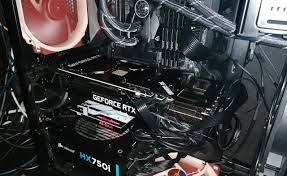
At its core, GPU overclocking revolves around manipulating the frequencies at which the graphics processor operates. By increasing these frequencies, the GPU can process more instructions per second, resulting in improved performance.
However, higher clock speeds also lead to increased heat generation and power consumption, necessitating adequate cooling solutions and power management.
Benefits of Overclocking GPU:
The primary benefit of GPU overclocking is improved gaming performance. By overclocking their graphics cards, users can achieve higher frame rates, reduced input lag, and smoother gameplay experiences.
Additionally, overclocking can lead to enhanced graphical fidelity, allowing for more detailed textures, realistic lighting effects, and smoother animations.
Also read: How To Know If GPU Will Fit In Case – Ultimate Guide – 2024
Risks and Considerations:
Despite its benefits, GPU overclocking carries certain risks. Excessive overclocking can lead to system instability, crashes, and even hardware damage.
Furthermore, overclocking voids the warranty of most graphics cards, leaving users solely responsible for any potential damage or malfunctions.
Tools and Software for GPU Overclocking:
To overclock a GPU, users typically rely on specialized software utilities provided by graphics card manufacturers or third-party developers. These utilities allow users to adjust various parameters such as core clock speed, memory frequency, and voltage settings.
Additionally, they provide real-time monitoring features to track temperatures, fan speeds, and performance metrics.
Best Practices for GPU Overclocking:
For beginners, it’s advisable to start with conservative overclocking settings and gradually increase clock speeds while monitoring system stability and temperatures. Stress-testing tools can help identify unstable configurations and ensure optimal performance under load.
Advanced users may explore voltage modifications and custom cooling solutions to further maximize overclocking potential.
Also read: Is Rust CPU or GPU Heavy – Complete Guide – 2024
Compatibility and Limitations:
Not all graphics cards are created equal when it comes to overclocking potential. While some GPUs may overclock significantly higher than their stock specifications, others may have more limited headroom due to factors such as silicon quality and thermal constraints.
Additionally, compatibility issues may arise with certain software utilities or hardware configurations.
What You Need to Overclock?
To overclock effectively, you need a capable GPU or CPU, reliable cooling solutions, overclocking software like MSI Afterburner, and knowledge of safe overclocking practices to optimize performance without damaging components.
Does GPU overclocking really work?
Yes, GPU overclocking can work and often leads to increased performance in graphics-intensive tasks such as gaming and rendering. However, it requires careful adjustments and monitoring to avoid overheating and instability issues.
What are the most common mistakes when overclocking?
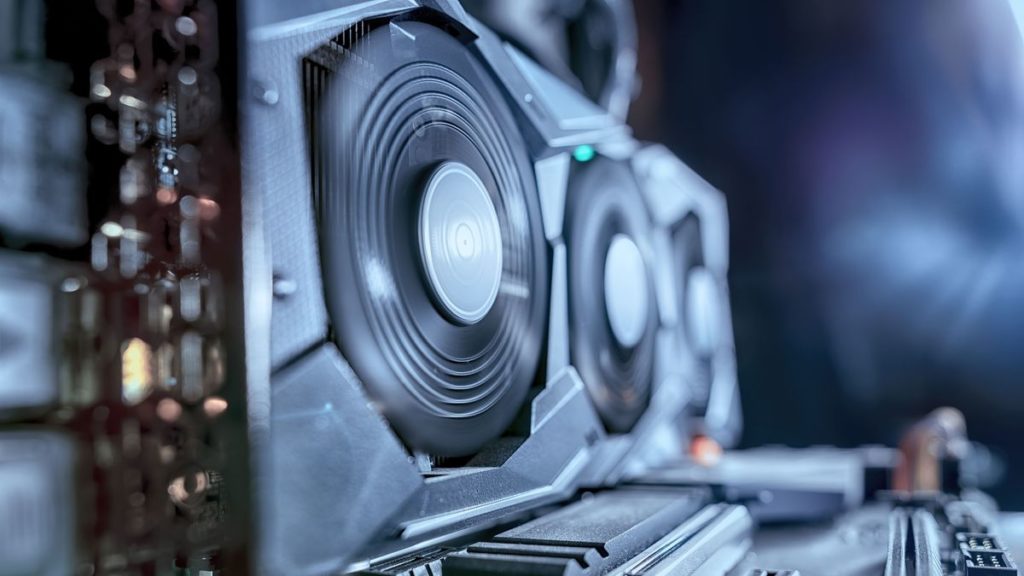
The most common mistakes when overclocking include inadequate cooling, pushing voltages too high, not monitoring temperatures, instability testing, and disregarding manufacturer guidelines or warranty implications.
Can you overclock a laptop GPU?
Yes, it’s possible to overclock a laptop GPU, but it’s more challenging and risky due to limited cooling and power constraints. Overclocking may also void warranties and increase heat generation.
Can I just buy a Pre-overclocked Card?
Yes, you can purchase pre-overclocked graphics cards. These cards come with higher clock speeds out of the box, offering increased performance without the need for manual overclocking.
Your overclocking checklist:
- Verify hardware compatibility.
- Ensure adequate cooling.
- Backup important data.
- Use reliable overclocking software.
- Start with small increments.
- Stress test for stability.
- Monitor temperatures and performance.
- Reset to default if unstable.
- Enjoy responsibly.
How to Overclock Your GPU to Boost Your Games’ FPS?
To overclock your GPU for higher FPS in games, use overclocking software like MSI Afterburner. Increase core and memory clock speeds gradually, monitoring temperatures and stability for optimal performance.
Is overclocking GPU safe?
Overclocking GPU can boost performance but carries risks like overheating and component damage. It’s generally safe if done cautiously with proper cooling and monitoring to avoid hardware issues.
Before you Overclock, Optimize your Software:
- Update drivers and firmware.
- Close unnecessary background programs.
- Disable power-saving features.
- Adjust system settings for performance.
- Ensure adequate system cooling.
- Monitor system resources.
- Backup important data.
- Familiarize with overclocking tools and guides.
- Proceed cautiously and responsibly.
Can I overclock every graphics card? Can I overclock my laptop?
Not every graphics card can be overclocked, and not all laptops support overclocking. Check your graphics card’s model and your laptop’s specifications to see if overclocking is possible.
The Pros And Cons Of GPU Overclocking:
Pros of GPU overclocking include enhanced gaming and graphics performance, potentially extending the lifespan of older hardware, and cost-effective performance boosts without upgrades.
Cons include increased power consumption, potential hardware damage or instability, voiding warranties, and the need for proper cooling solutions. Overclocking requires technical knowledge and careful monitoring to mitigate risks.
Is GPU Overclocking Worth It?
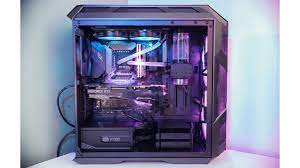
GPU overclocking can be worth it for enthusiasts seeking performance boosts in gaming and graphics tasks. However, it entails risks such as voiding warranties and potential hardware damage if not done carefully. Users should weigh benefits against potential drawbacks before overclocking their GPUs.
What does overclocking your graphics card really do?
Overclocking your graphics card involves increasing its clock speed and sometimes adjusting voltage to enhance performance. This results in higher frame rates and smoother gameplay in tasks like gaming and graphic-intensive applications.
However, it also increases power consumption and generates more heat, requiring proper cooling and monitoring to prevent damage.
What are the pros and cons of overclocking your CPU and GPU for gaming?
Overclocking CPU and GPU for gaming can elevate performance, improving frame rates and overall gaming experience. It’s cost-effective, maximizing hardware potential without upgrades.
However, it risks hardware damage, voids warranties, and may cause stability issues or overheating if not managed properly.
What are the benefits of overclocking? What are the drawbacks of overclocking?
Overclocking can boost CPU and GPU performance, enhancing gaming and productivity. It offers cost-effective performance gains without hardware upgrades.
However, overclocking may reduce hardware lifespan, void warranties, and increase power consumption. Stability issues and overheating are common drawbacks, requiring careful monitoring and cooling solutions.
How to overclock your CPU and GPU safely?
To overclock your CPU and GPU safely, first, research your hardware limits. Use reliable software to make gradual adjustments, monitoring temperatures and stability.
Ensure proper cooling and power supply. Test stability thoroughly to avoid damage. Always proceed cautiously to prevent hardware harm.
How to Overclock Your Graphics Card?
To overclock your graphics card, use software like MSI Afterburner or EVGA Precision X. Increase core clock and memory clock speeds gradually. Monitor temperatures and stability using stress tests. Be cautious, and ensure proper cooling to avoid damage.
What are some tips and best practices for overclocking?
For overclocking, start with small increases in clock speeds and voltages. Monitor temperatures closely and ensure adequate cooling. Test stability using stress tests. Backup settings and gradually tweak for optimal performance. Remember, patience and caution are key to successful overclocking.
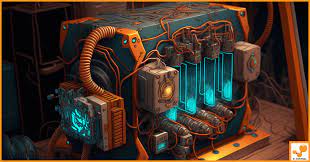
Faqs:
1. How much FPS can you possibly get by overclocking your GPU?
The FPS increase achievable by overclocking a GPU varies widely and depends on factors like the GPU model, the extent of overclocking, system configuration, cooling solutions, and software optimization. There’s no fixed value; results vary case by case.
2. Does overclocking GPU give more FPS?
Yes, overclocking the GPU can potentially increase FPS (frames per second) in games and other graphical applications by allowing the GPU to process data at a faster rate, thus improving overall performance.
3. How much FPS will overclocking a GPU to 100% give?
The FPS increase from overclocking a GPU to its maximum potential, labeled as “100%,” varies greatly. It depends on factors like the original hardware specifications, cooling, stability, and the demands of the software being run.
4. Does overclocking GPU increase FPS?
Yes, overclocking the GPU can increase FPS (frames per second) in games and other graphical applications by allowing the GPU to process data at a faster rate, thus improving overall performance.
5. Does overclocking graphics processors actually give much of a performance increase?
Overclocking graphics processors can yield performance boosts, enhancing FPS and graphical capabilities in tasks like gaming and rendering. However, the extent of improvement varies based on factors like hardware, cooling, and stability.
6. How much FPS can you gain by overclocking your CPU and GPU together in one PC?
The FPS gain from overclocking both CPU and GPU depends on various factors like the initial hardware specs, cooling solutions, and stability. Generally, it can lead to noticeable improvements, but specific gains vary widely.
7. Does overclocking monitor give you more FPS?
No, overclocking a monitor does not directly increase FPS. It may improve refresh rates, making motion smoother, but FPS depends on the capabilities of the GPU and software demands.
8. Does overclocking a GPU increase FPS for smoother and sharper graphics?
Yes, overclocking a GPU can increase FPS, resulting in smoother and sharper graphics by pushing the hardware to operate at higher speeds, thus enhancing performance in gaming and graphical tasks.
9. What happens if you overclock the GPU too much?
Overclocking the GPU excessively can lead to instability, overheating, crashes, and potential hardware damage. It may void warranties and degrade performance over time due to increased stress.
10. Is there a limit to the amount of FPS you can gain from overclocking because of GPU bottlenecking?
Yes, overclocking can improve FPS, but GPU bottlenecking may limit the extent. While overclocking enhances performance, the bottleneck restricts FPS gains beyond a certain point.
Conclusion:
In conclusion, overclocking your GPU can boost performance in gaming and graphics tasks, but it comes with risks like overheating and hardware damage. While it offers benefits like increased FPS and smoother gameplay, users should proceed cautiously and consider factors like cooling and stability. Be careful when overclocking to avoid problems.

